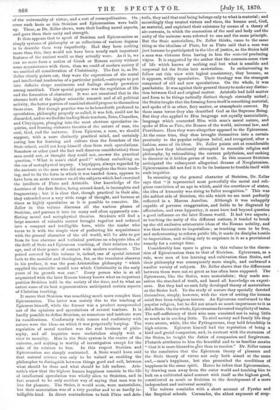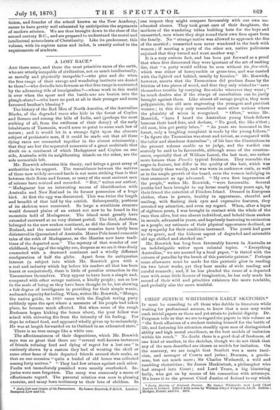BOOKS.
THE STOICS, EPICUREANS, AND SCEPTICS.*
IN the closing chapters of his work on Socrates and the Socratic schools, Dr. Zeller has discussed the antecedents of the Stoic and Epicurean philosophies, which systems form the main subject of the present volume. The imperfect Socratic schools, as he calls them, are chiefly interesting as indicating the direction which the thought of the ancient world was beginning to take. In the fourth century B.C., to which they belong, Greece was becoming intellectually and politically feeble. Her mental powers, great as they were, had been tasked to the utmost by the speculations of Plato and Aristotle ; her love of freedom was rapidly decaying in the face of Macedonian supremacy. The Greek world, how- ever, was much too restless to be able to dispense with philosophy; it only insisted that philosophy should aim at something practical, and teach people how to be happy and contented. Though it had not the intellectual vigour of former days, its mental horizon had been enlarged by contact with the East. New ideas, sonic of them quite antagonistic to the Greek traditional views of life, find a place in all post-Aristotelian philosophy. Conspicuous among these were an indifference to everything external, a sense
• The Stoics, Epicureans, and &Via. Translated from the German of Dr. E. Zeller, by 0. J. Reid:tel. London : Longman. 1870.
of the universality of virtue, and a sort of cosmopolitanism. On some such basis as this Stoicism and Epicureanism were built up. These, as Dr. Zeller shows, were their leading moral aspects, and gave them their unity and strength. It thus appears that to speak of Stoicism and Epicureanism as simply systems of philosophy or as collections of various dogmas is to describe them very imperfectly. Had they been nothing more than this, they would not have been nearly such important features of the ancient world as they actually were. As it is, we can no more form a notion of Greek or Roman society without some acquaintance with them, than we could of modern society if we omitted all consideration of Christianity. The fact is, as Dr. Zeller clearly points out, they were the expressions of the moral and intellectual tendencies of a particular period,—attempts to put into definite shape sentiments and feelings already prevalent among mankind. Their special purpose was the regulation of life and the formation of character. It was not unnatural that in the absence both of the higher scientific research and of all political activity, the better portion of mankind should propose to themselves these aims. But though practice was to be henceforth preferred to speculation, philosophy properly so called, it was felt, could not be discarded, and so we find the leading Stoic teachers, Zeno, Cleanthes, and Chrysippus, plunging into the most abstruse speculative in- quiries, and framing elaborate theories of the nature of man, the soul, God, and the universe. Even Epicurus, a man, we should suppose, with a more distinctly practical mind, and certainly caring less for learning and culture than the founders of the Stoic school, could not keep himself clear from such speculations. Somehow or other (and the fact well deserves consideration) these men could not, or thought they could not, answer the practical question, " What is man's chief good?" without embarking on the sea of metaphysical inquiry. Chrysippus, always regarded by the ancients as the man who did most to complete the Stoic teach- ing, and to fix the form in which it was handed down, appears to have been an acute reasoner on all the subjects which had exercised the intellects of Plato and Aristotle. Our knowledge of the doctrines of the first Stoics, being second-hand, is incomplete and fragmentary ; but it is clear that, though practical in their aim, they extended over a very wide range of thought, and became at times as highly speculative as it is possible to conceive. Dr. Zeller in this volume discusses all the various phases of Stoicism, and pursues it into its many and often apparently con- flicting moral and metaphysical theories. Students will find a large amount of valuable matter brought together and reduced into a compact and intelligible form, while the reader who turns to it with the simple view of perfecting his acquaintance with the general character of the old world, will be able to get from its less abstruse and technical portions an adequate idea of the drift of Stoic and Epicurean teaching, of their relation to the age, and of their points of contact with modern sentiment. The period covered by this volume is, indeed, one of special interest both to the moralist and theologian, for, as the translator observes in his preface, it was the post-Aristotelian philosophy " which supplied the scientific mould into which Christianity in the early years of its growth was cast." Every person who is at all acquainted with the later Roman history knows what an important position Stoicism held in the society of the time, and to what an extent some of its best representatives anticipated certain aspects of Christian teaching.
It seems that Stoicism was something much more complex than Epicureanism. The latter was mainly due to the teaching of Epicurus himself, while the former was a product compounded out of the opinions and speculations of several teachers. It is hardly possible to define Stoicism, so numerous and intricate were its ramifications. Conformity with reason and conformity with nature were the ideas on which it was perpetually harping. The regulation of moral conduct was the real business of philo- sophy, and all inquiries were undertaken simply with a view to morality. Man in the Stoic system is the centre of the universe, and nothing is worthy of investigation except for the sake of its relation to him. In this respect Stoicism and Epicureanism are sharply contrasted. A Stoic would have said that natural science was only to be valued as enabling the philosopher to distinguish between things good and evil, between what should be done and what should be left undone. Aris- totle's view that the highest human happiness consists in the life of intellectual speculation was wholly alien to Stoicism, and in fact seemed to be only another way of saying that man was to live for pleasure. The Stoics, it would seem, were materialists, but their materialism was of a very peculiar and to us hardly in- telligible kind. In direct contradiction to both Plato and Aria- totle, they said that real being belongs only to what is material ; and accordingly they treated virtues and vices, the human soul, God, as material, and explained their existence by means of a theory of air-currents, in which the connection of the soul and body and the unity of the universe were referred to one and the same principle. But the Stoic materialism, Dr. Zeller thinks, came to the same thing as the idealism of Plato, for as Plato said that a man was just because he participated in the idea of justice, so the Stoics held a man was virtuous from having in him the material producing virtue. It is suggested by the author that the common-sense view of life which knows of nothing real but what is sensible and corporeal led the Stoics into materialism. In endeavouring to follow out this view with logical consistency, they became, as it appears, wildly speculative. Their theology was the strangest compound of old and new speculations. On the whole, it was pantheistic. It was against their general theory to make any distinc- tion between God and original matter. Aristotle had held matter and form to be things radically distinct though eternally united ; the Stoics taught that the forming force itself is something material, and spoke of it as ether, fiery matter, or atmospheric current. By these same terms they also described God as the Supreme Being. But they also applied to Him language not eqUally materialistic, language which connected Him with man's moral nature, and spoke of Him as Fate, the Reason of the world, universal law, and Providence. Here they were altogether opposed to the Epicureans. At the same time, they thus brought themselves into a certain proximity to the popular religious belief, and recognized, after a fashion, some of its ideas. Dr. Zeller points out at considerable length how they laboriously attempted to reconcile religion and philosophy, by rationalizing the current polytheism, and seeking to discover in it hidden germs of truth. In this manner Stoicism anticipated the subsequent allegorical dreams of Neoplatonism. Epicureanism did not feel it to be its business to trouble itself with such inquiries.
In summing up the general character of Stoicism, Dr. Zeller says that " it represented most powerfully the moral and reli- gious conviction of an age in which, amid the overthrow of states, the idea of humanity was rising to fuller recognition." This was the noblest side of Stoicism, the side which we see most perfectly reflected in a Marcus Aurelius. Although it was unhappily capable of perverse exaggeration, and liable to be disgraced by affectation, and even hypocrisy, it must have had beyond question a good influence on the later Roman world. It had two aspects ; as teaching the unity of the different nations, it tended to break up the old exclusive aristocratic ideas of the Roman nobility, and was thus favourable to imperialism ; as teaching men to be free, and endeavouring to reform public life, it made its disciples hostile to imperialism, and willing only to acquiesce in it as a provisional remedy for a corrupt time.
Considerably less space is given in this volume to the discus- sion of Epicureanism than to that of Stoicism. Epicureans, as a rule, were men of less learning and cultivation than Stoics, and their philosophy was consequently more simple, and embraced a smaller variety of subjects. Dr. Zeller shows that the differences between them were not so great as has often been supposed. The Epicureans, like the Stoics, were materialists ; they made sen- sation the standard of truth, and based all knowledge on experi- ence. But they had no such fully developed theory of materialism as the Stoics had. To the study of nature they specially devoted themselves, simply, however, with the view of setting the human mind free from religious terrors. An Epicurean conformed to the popular religion, but he did not attach so much importance to it as did a Stoic. On the whole, Epicureanism favoured simplicity of tastes. The self-sufficiency of their wise man consisted not in using little so much as in needing little. To civil society and family life they were averse, while, like the Pythagoreans, they held friendship in high esteem. Epicurus himself had the reputation of being a kind and genial companion, and, in contrast with the sternness of the Stoics, he taught the duties of compassion and forgiveness. Plutarch attributes to him the beautiful and to us familiar maxim " that it is more blessed to give than to receive." Dr. Zeller comes to the conclusion that the Epicurean theory of pleasure and the Stoic theory of virtue not only both aimed at the same end, —man's happiness, but also prescribed the conditions of happiness in the same spirit. Hence he infers that Epicureanism, by drawing man away from the outer world and teaching him to look on a cultivated mind content with itself as the highest good, contributed as much as Stoicism to the development of a more independent and universal morality.
The volume concludes with a short account of Pyrrho and the Sceptical schools. Carneades, the ablest exponent of seep-
ticism, and founder of the school known as the New Academy, seems to have pretty well exhausted by anticipation the arguments of modern atheism. We are thus brought down to the close of the second century B.C., and are prepared to understand the moral and intellectual antecedents of Christianity. Like its predecessor, this volume, with its copious notes and index, is exactly suited to the requirements of students.
































 Previous page
Previous page